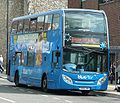This article needs additional citations for verification .(December 2009) |
| Volvo B7TL | |
|---|---|
 | |
| Overview | |
| Manufacturer | Volvo |
| Production | 1999–2007 |
| Body and chassis | |
| Doors | 1 or 2 |
| Floor type | Low floor |
| Powertrain | |
| Engine | Volvo D7C (7.3 L) |
| Power output | 215–250 hp (160–186 kW) |
| Transmission | Voith DIWA ZF Ecomat 5HP502C/6HP502C |
| Chronology | |
| Predecessor | Volvo Olympian |
| Successor | Volvo B9TL (2-Axle) |
The Volvo B7TL is a low-floor double-decker bus chassis which was launched in 1999 and replaced the 2-axle version of the Volvo Olympian (its 3-axle version was replaced by the Volvo Super Olympian). It was built as the British bus operators seemed hesitant to purchase the B7L double decker with a long rear overhang (although some have since entered service in Glasgow, Scotland as 12 m long double deckers).
Contents
The B7TL chassis was designed by the Leyland Product Developments consultancy based at the Leyland Technical Centre. It was initially built in Irvine, North Ayrshire, Scotland. In 2000, production was gradually transferred to Sweden. In mid-2004, production of the MkII version of the B7TL was started.
Like the Olympian, the B7TL features a transversely-mounted rear engine and a shorter rear overhang, but the radiator was mounted on the right side of the engine compartment. It was equipped with Volvo D7C engine and ZF or Voith gearbox. The B7TL was initially available with Alexander ALX400 and Plaxton President bodywork, later followed by East Lancs Vyking and Myllennium Vyking bodies, and also the Wright Eclipse Gemini.



